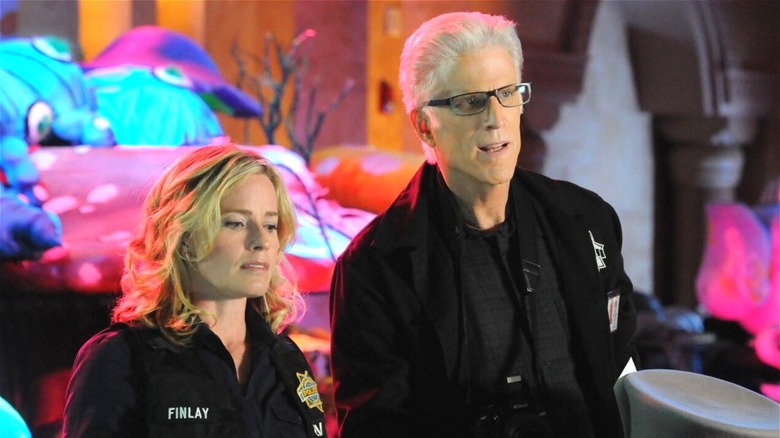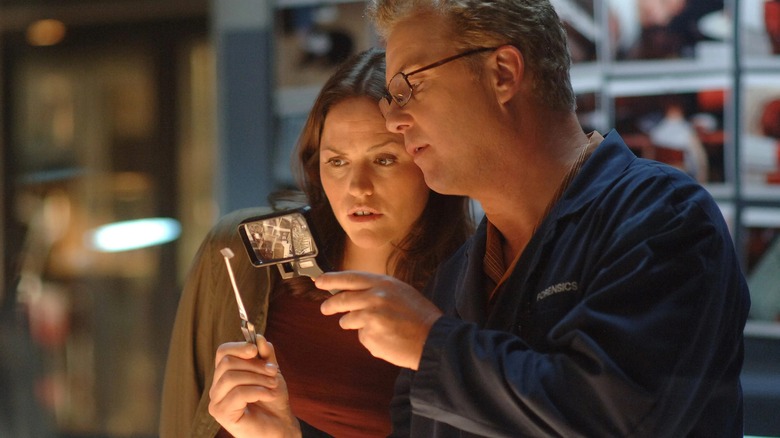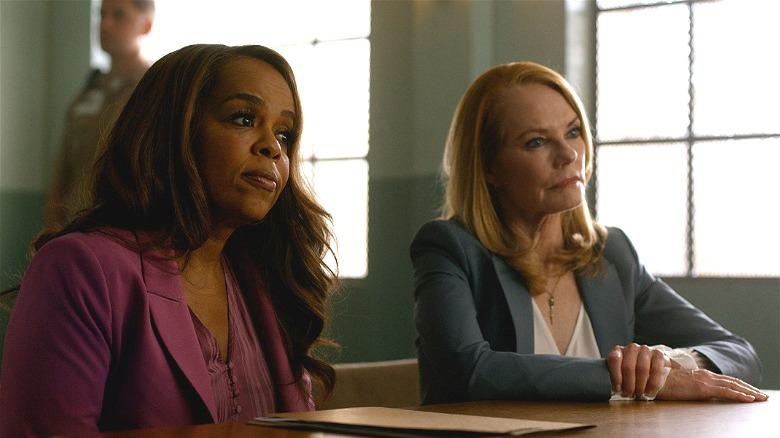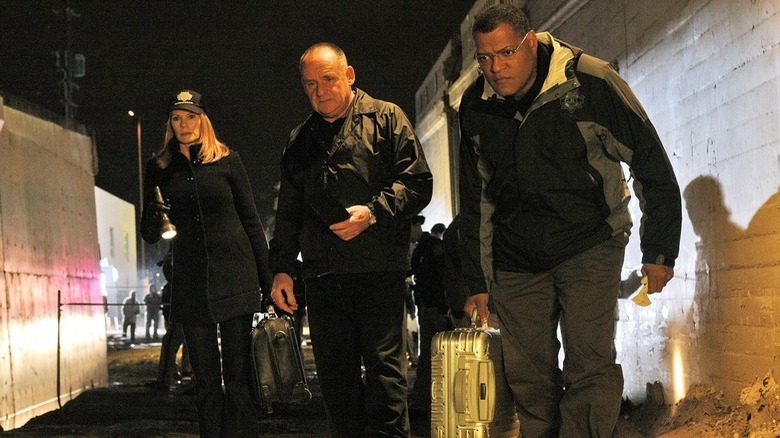Does CSI Feed A False Sense Of Reality In Actual Crime Cases? (Many Say Yes)
It's easy to forget how influential the original "CSI: Crime Scene Investigation" series was. Its October 2000 premiere was the first of its kind; a drama highlighting the forensic science behind crime scene investigations. According to Clark County, Nevada coroner Mike Murphy, the show had a huge impact. "I think that 'CSI' has done some great things for medico-legal death investigations," Murphy, whose office is the show's inspiration, told NPR. "It has brought what we do from the shadows — where people really didn't want to know and didn't care what we do — to the bright light of day." However, he added that it has "also caused some problems."
These problems stem from what's called the CSI Effect. This refers to real-life jurors expecting to see the same easy solutions to heinous crimes that they see on television. Some "CSI" viewers are becoming wise to this, partly because of another hugely influential series, the podcast "Serial." It stormed the airwaves in 2014 and blew up the flawed murder investigation of high school student Hae Min Lee, whose boyfriend, Adnan Syed, served 23 years in prison for a crime that he has always maintained he didn't commit (Syed was released in 2022, largely thanks to "Serial").
"'Serial' has ruined tv for me — in a good way," u/thenewstampede said on Reddit. "I'm not saying that I thought crime investigation was as neat and simple as tv makes it seem, but seeing the complexities of a case like Hae Min Lee has definitely affected my ability to enjoy tv without questioning the reality of the investigations that it portrays like I did before." They certainly aren't alone in this opinion.
CSI paints an unrealistic picture of DNA analysis
When Redditer u/Ladybugsrule asked whether "'CSI' created a false sense that all crime scenes have clear physical evidence of who committed the crime," many fans replied yes. Notably, u/buffyfan12 listed several things jurors now expect to see because of crime procedurals, such as high technology, lots of blood spatter, and lightning-fast, highly reliable DNA results. Judges and lawyers have had similar complaints about the show and jurors' expectations — especially regarding DNA testing.
DNA testing is much more complicated than it appears on television. For one, it takes weeks or months, not minutes, to get a result. And with potentially several DNA contributions to a piece of evidence, it can be nearly impossible to narrow them down. "We never use the word 'match,'" NYPD hair and fiber analyst Lisa Faber told The New Yorker. "The terminology is very important. On TV, they always like to say words like 'match,' but we say 'similar,' or 'could have come from' or 'is associated with.'" Oregon DNA supervisor Michael Koch agrees, telling KVAL, "I've seen the most surprise in jurors when we get a mixture off a piece of evidence and we can't make a conclusion."
According to Massachusetts forensic science undersecretary John Grossman, shows like "CSI" have made it "much harder" for those in his field to do their jobs. "Juries now expect high-level science to be done on lots of cases where again we don't have the resources to do them, and in many cases, the science doesn't exist to do them," he told NPR. And that ignores situations where there is no DNA evidence to be found, no matter how thorough the investigation.
Not that many cases go to trial
Lawyers have also complained about how evidence collecting is portrayed on "CSI," just one of the many things "CSI" gets wrong about forensics. "We don't have multiple teams descending on the crime scene in Humvees and spending the entire week working on one homicide case," Oregon District Attorney Alex Gardner told KVAL, which noted that DAs often have caseloads of 150 new cases each week.
When it comes to forensics, each person has their field, whether that be hair and fiber analysis, fingerprints, blood, handwriting, cell phone hacking, tire marks, or firearms, and evidence collection itself requires specialized training. It's unlikely that one brilliant technician — like Abby Sciuto (Pauley Perrette) on "NCIS," for example — would have all the specialized training to do every test imaginable, even if the science exists in the first place. That's part of why it takes so long to get results: Samples are often sent to outside laboratories for testing.
Furthermore, in cases where prosecutors can collect enough evidence, criminal cases rarely go to trial. For one, prosecutors will only file criminal charges if they can prove guilt beyond a reasonable doubt. Some cases are dismissed, while more than 90% result in plea bargains and never go to trial. And that's if a suspect is actually arrested to begin with — per FBI figures (via Vox) released in 2017, the solve rate for murder is only 61.6% in America.
Procedurals like "CSI" and "Law & Order" generally follow — and solve — a new case each week, meaning they must move fast, and it's obviously more dramatic if the case goes to trial. However, that's just not the reality.
It all seems so political
How realistic are these complaints about the CSI Effect? Michigan judge Donald Shelton doesn't believe it has as big an impact as many have made out, telling NPR that "no empirical research" exists to back it up. "Even the so-called studies that were out there were simply surveys of lawyers' opinions," he added. In his own study with colleagues, Shelton found it was "too simplistic" to blame television shows like "CSI," and that jurors are often more influenced by what they see in their world, especially regarding technology. "The more sophisticated technological devices that jurors had," Shelton said, "the higher their expectations for the prosecutors to present evidence." Nonetheless, lawyers still believe the effect is real — and it often seems to become political.
Whenever the CSI Effect is brought up, the rhetoric can sound a little biased. It often descends into prosecutors versus defense attorneys. Shows like "Law & Order" are frequently criticized for so-called "copaganda" and villainizing defense attorneys. Defense lawyers accuse prosecutors of using the CSI Effect as an excuse for a lack of evidence. As u/I_W_N_R, who self-identified as a lawyer on Reddit, said, "Prosecutors love to whine about it but I don't think it's anywhere near as big a problem as they make it out to be," while public defender Greg Hazarabedian told KVAL, "I think that effect has helped teach constitutional values to Americans."



